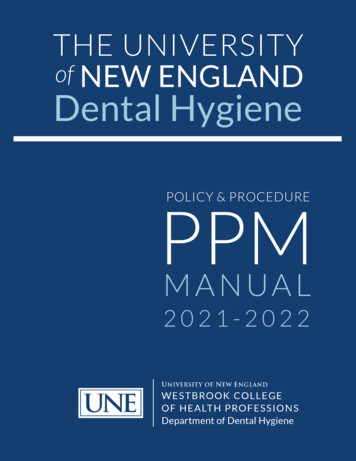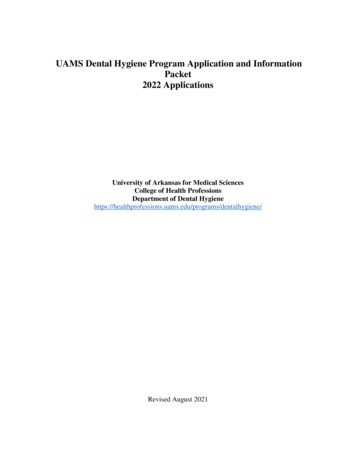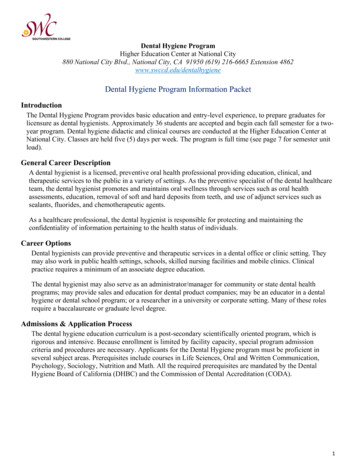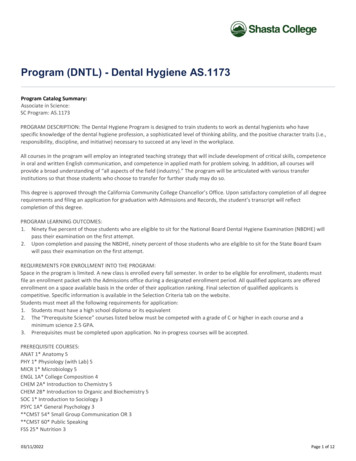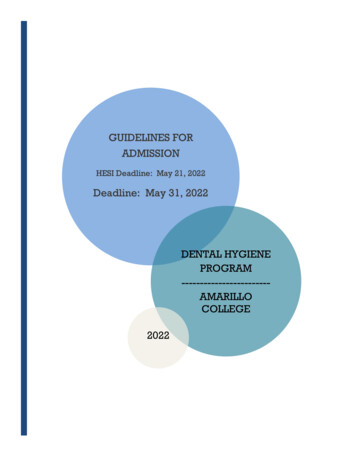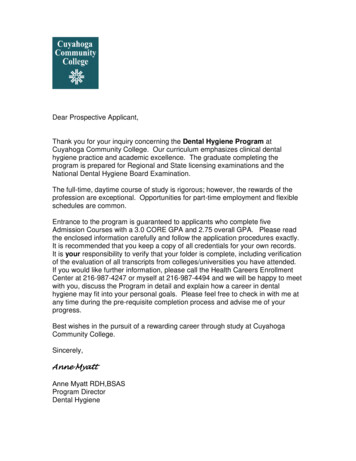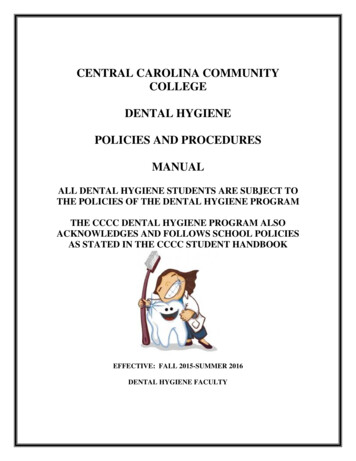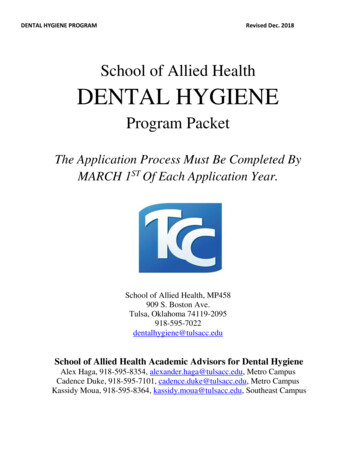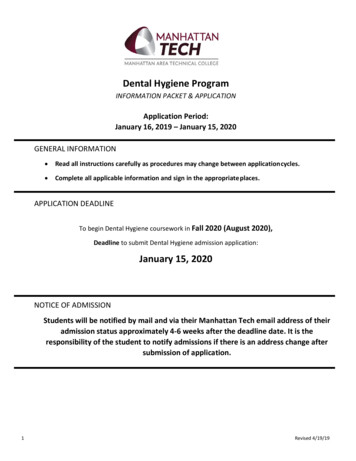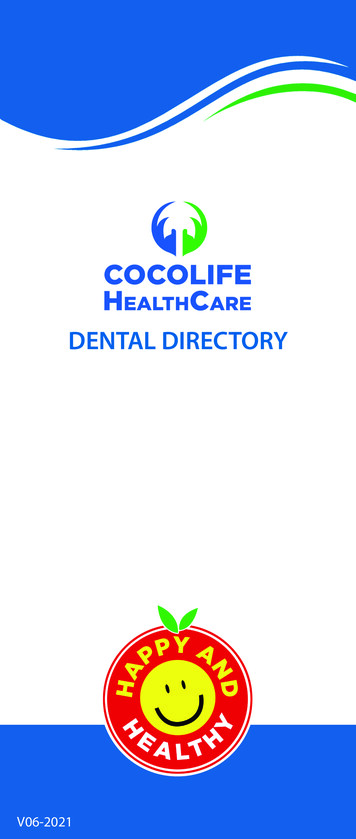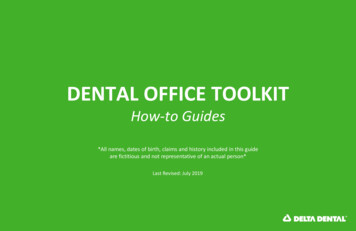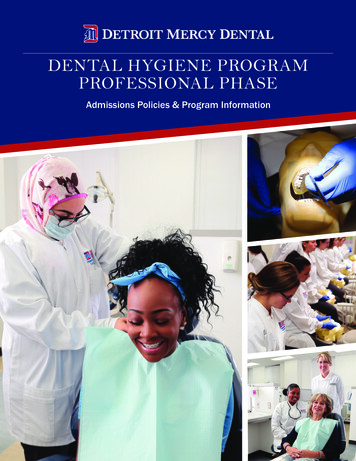
Transcription
DENTAL HYGIENE PROGRAMPROFESSIONAL PHASEAdmissions Policies & Program Information
BE PART OFDetroit Mercy DentalAt the University of Detroit Mercy School of Dentistry, you will receive anexcellent dental hygiene education to prepare you for a fulfilling career. Ifyou are committed to excelling in a dynamic and comprehensive academicenvironment, dedicated to becoming a provider of top-notch clinical care, andbelieve that a professional life includes serving those in need,Detroit Mercy Dental is the choice for you!We invite you to be a part of a collaborative, comprehensive culture ofinfluencers, learners and leaders.We invite you to be a part ofDetroit Mercy Dental.
TABLE OF CONTENTSGeneral Information3Program Goals4Program Competencies5Technical Standards12Prerequisite Courses15Pre-Application Information and Application Process16Evaluation Criteria17Admissions Criteria18Admissions Rating Form19Admissions Status20Current Class Profile21Potential Sources of Financial Aid22Estimated Costs23Clinical Dental Hygiene Curriculum24Factors to Consider25admin info 20212
General InformationThe Professional Dental Hygiene Program offers a Bachelor of Science in Dental Hygiene. Theapplication cycle opens on November 1st and closes February 1st. The Dental Hygiene Programbegins at the end of May in the Summer Semester.The Professional Dental Hygiene Program does not keep a waiting list. Admission iscompetitive and starts anew each year. Priority is given to the candidates with the highestscholastic aptitude.Students will be notified before April 1st as to their admission status within their applicationportal.All Mandatory Prerequisite and Core Curriculum* must be completed by the end of the Wintersemester prior to the start of the program (*2 Core Curriculum courses may be completedduring the Dental Hygiene Program, but this is not advised due to the challenging nature of theprogram).Pre-Application Steps:AdvisingAll students are required to schedule an advising session once declaring interest in the dentalhygiene program. Advising sessions will be scheduled with one of the Dental HygieneAdmissions Co-Directors by calling 313-494-6625. Topics of discussion will include but are notlimited to: Mandatory Prerequisite and Core Curriculum; students as partners; expenses andgrant opportunities; applicant’s knowledge of the Dental Hygiene profession; immunizationsand testing related to infectious diseases; and background check.For more information about the Professional Dental Hygiene program contact:Phone: 313-494-6625E-mail: dentalhygiene@udmercy.eduWeb: min info 20213
Program Goals1. Prepare a qualified dental hygienist who will be competent with respect to theUniversity of Detroit Mercy School of Dentistry, Division of Dental Hygiene, and followingthe Competencies for the Graduating Dental Hygienist.2. Maintain a contemporary dental hygiene program that reflects relevant and currentdental hygiene practice.3. Provide a dynamic interdisciplinary dental and dental hygiene curriculum that integratesbiomedical, clinical, and behavioral sciences.4. Maintain admission policies to ensure admission of a qualified and diverse studentbody.5. Maintain a baccalaureate degree completion program to support and encouragecontinued formal dental hygiene education.6. Provide quality individualized patient centered dental hygiene care.7. Participate in collaborative community health promotion in Detroit and SoutheasternMichigan communities.8. Serve as a resource of oral health knowledge and education for the health carecommunity.9. Engage in professional association activities.10. Demonstrate leadership in dental hygiene education and research.11. Provide service to the School of Dentistry and the University communities.admin info 20214
University of Detroit Mercy School of DentistryCompetencies for the Graduating Dental Hygienist(Including Foundation Knowledge and Skills)PreambleCompetencies for the University of Detroit Mercy Dental Hygiene Graduate identifies andorganizes the knowledge and skills the graduate must acquire to become a competentpractitioner in dental hygiene. The document also reflects a curriculum that is patient-driven,competency-based, and criterion referenced.The dental hygienist is an integral member of the oral health care team collaborativelypracticing evidence-based comprehensive dental hygiene care with the goal of improving thehealth of society. The dental hygienist must have a foundation in biomedical science and strongclinical skills as well as the demonstration of professional and ethical behavior, and effectivecommunication and interpersonal skills. In addition, he/she must have the ability to evaluateand utilize emerging technologies, continuing professional development opportunities, andproblem-solving and critical thinking skills to effectively address current and future issues inhealth care.As used in this document, competency is a complex behavior or ability essential for the dentalhygienist to begin the practice of dental hygiene. Competency includes knowledge, experience,critical thinking and problem-solving skills, professionalism, ethical values, and technical andprocedural skills. These components become an integrated whole during the delivery of patientcare by the competent dental hygienist. Competency assumes that all behaviors are performedwith a degree of quality consistent with patient well-being and that the dental hygienist canself-evaluate treatment effectiveness. In competency-based dental education, what studentslearn is based upon clearly articulated competencies and further assumes that allbehaviors/abilities are supported by foundation knowledge and psychomotor skills inbiomedical, behavioral, ethical, clinical dental science, and informatics areas that are essentialfor an entry-level dental hygienist. In creating curricula, faculty members have considered thecompetencies to be developed through the educational process, the learning experiences thatwill lead to the development of these competencies, and ways to assess or measure theattainment of competencies.Domains:1. Professionalism2. Interpersonal Communication Skills to Function Successfully in a Multicultural WorkEnvironment with Diverse Populations3. Critical Thinking4. Health Promotion5. Practice Management and Informatics6. Patient Careadmin info 20215
1. Professionalism1.1. Demonstrates personal/professional responsibility to the welfare of society throughservice activities. Service learning Social justice1.2. Practice within the context of ethical and legal standards in the provision of dentalhygiene care. Ethical decision making and conflicting obligations Legal and regulatory principles and standards Practices within the context of professional obligations and jurisdictional Code ofEthics1.3. Participate in professional organizations at the local, state, and/or national level. Organized dental hygiene association activities1.4. Practice within one’s scope of competence, and consults with or refers to professionalcolleagues when indicated. Self-assessment of competence Demonstration of responsibility and accountability for actions within the variousroles of the dental hygienist Standards of care, regulations and policies Communication skills, both orally and in writing, with patients, patients’ families,colleagues, and others with whom other health care providers must exchangeinformation in carrying out their responsibilities Scope of practice of dental hygiene and medical specialties and social supportservices Identification of community resources for referrals Personal well-being Implementation of corrective measures to address personal and professionaldeficiencies of self2. Interpersonal Communication Skills to Function Successfully in a Multicultural WorkEnvironment with Diverse Populations2.1 Apply appropriate interpersonal and communication skills with patients, dental andinter-professional health care team members. Communication theory and skills Interpersonal (one-on-one) communication principles Verbal and nonverbal communication principles Conflict resolution Reflective listening Collaboration with intra/ inter-professional health care team Emotional and behavioral development and sensitivity Physiological and psychological indications of anxiety and fear Addressing patient concerns/issues/problems Behavior modification and motivation techniques Special needs/diversity of patients Health literacyadmin info 20216
Language barriers Cognitive barriers2.2 Apply psychosocial and behavioral principles in patient-centered health care. Counseling skills and motivational interviewing principles Social and behavioral applied sciences Behavior modification Fear and anxiety management Pain management (acute and chronic pain) Geriatrics Special patient needs Cultural competence2.3 Communicate effectively with individuals from diverse populations. Influence of culture on health and illness behaviors Influence of culture related to oral health Complementary and alternative therapies Communication with patients, dental and inter-professional team members in aculturally sensitive manner Communication in overcoming language barriers Communication with special needs patients Communication skills to address diversity- related conflict3. Critical Thinking3.1 Evaluate and integrate emerging trends in health care and determine their value indental hygiene practice. Trends in health care Health care policy Economic principles of health care delivery Health care organization and delivery models Quality assessment and quality assurance Demographics of oral health care relationships Relationship of systemic health to oral health and disease Impact of political and social climate on health care delivery Critically evaluates health care literature Critically evaluates sales and continuing education presentations3.2 Utilize critical thinking and problem-solving skills. Application of scientific method to clinical problem-solving Evidence-based delivery of oral health care Clinical reasoning skills Diagnostic skills Treatment planning Self-assessment Reading comprehension Verbal and written communication skills Computer literacyadmin info 20217
Utilization of current information systems to access medical/dental databases/information3.3 Evaluate and integrate best research outcomes with clinical expertise and patientvalues for evidence-based practice. Application of scientific method to clinical problem-solving Evidence-based delivery of oral health care Critical thinking and problem-solving skills Cultural competence Communication skills, verbal and written Reading comprehension Ethics Statistics literacy Computer literacy Utilization of current information systems to accessmedical/dental/databases/information Epidemiological methods4. Health Promotion4.1 Provide prevention, intervention, and educational strategies. Patient and family communication Education of patients and/or family Risk assessment Prevention strategies (intervention, motivation, nutrition) Clinical evaluation Utilization of the principles of learning and instruction in patient education4.2 Participate with dental team members and other health care professionals in themanagement and health promotion for all patients. Various practice settings (community settings) Organizational behavior of team Professional communication Collaborative and leadership skills Inter-professional education4.3 Apply community dental health principles (assess, plan, implement and evaluateprograms) to prevent disease and promote health. Cultural competence Barriers to improving oral health Global health Population trends National and international health goals5. Practice Management and Informatics5.1 Evaluate and apply contemporary and emerging information including clinical andpractice management technology resources. Data analysis for dental hygiene care productivity Basic understanding of computer software Basic computer utilization skills admin info 20218
Application of contemporary electronic information systems Computer systems for practice management5.2 Apply principles of risk management including informed consent and appropriaterecord keeping in patient care. Principles of record keeping/documentation Concepts of professional liability Risk management protocols Legal responsibilities in patient care management Legal responsibilities in personnel management Management of patient information Quality assurance5.3 Apply business and practice management skills. Employment laws and regulations Identification of career options Demonstration of effective time management skills Assesses patient satisfaction and responds appropriately Effective communication skills Leadership and motivation skills Organizational behavior Data analysis for dental hygiene care productivity5.4 Apply quality assurance, assessment, and improvement concepts. Self-assessment for quality improvement Concepts and principles of quality assurance and quality assessment Awareness of continuous professional development (lifelong learning)5.5 Comply with local, state, and federal regulations including OSHA and HIPAA. Elements of applicable local, state, and federal regulations Methods of effective application and pursuance of local, state, and federalregulations6. Patient Care6.1 Obtain, record, update and organize accurate and complete medical/dental historiesincluding pertinent psychological and socioeconomic information. Establishment of a patient dialogue to obtain demographic, medical, family anddental histories, psychological and socioeconomic information relevant to dentalhygiene care, and patient expectations and goals for dental hygiene care Establishment of a patient dialogue to obtain and record the chief complaint ofthe patient and the history of the present illness Establishment of and maintenance of the patient record as an accurate andconsistent legal document of patient encounters Identification of the patient’s record including but not limited to medication(s),potential effect(s) on dental and systemic health, and impact on dentaltreatment Initiation of necessary medical and/or dental consultation or referral in legalmedia to clarify questions related to the patient’s dental and systemic healthadmin info 20219
6.2 Perform, record and organize a physical assessment appropriate for dental hygienecare. Performance and recording of an appropriate physical examination not limited tothe head and neck Recording of intraoral examination findings including but not limited to dentalcharting, periodontal examination and indices Identification of the need and/or performance of and recording of results ofother diagnostic procedures and tests Identification of the signs and management of the symptoms of medicalemergencies Identification of the signs of physical, psychological, verbal and substance abuse Performance of risk assessments6.3 Formulate a dental hygiene diagnosis utilizing and congruent with the dental diagnosisand other health professionals. Interpretation and correlation of examination and assessment findings Determination of the unmet needs of the patient based on analysis ofassessment findings Formulation of dental hygiene diagnosis Determination of priorities and establishes oral health goals with the patientand/or family and/or guardian as an active participant Planning of treatments that reflect the impact of behavioral, social and culturaldifferences in the provision of dental health care Development of dental hygiene care plans that reflect the impact of systemicdisease and its management on the provision of dental care Development of dental hygiene care plans consistent with and supportive of thepatient’s overall dental treatment plan Establishment of a planned sequence of educational and clinical services thatinclude health promotion, and therapeutic and maintenance care Communication of the plan for dental hygiene care to interdisciplinary healthteam members to determine its congruence with the overall plan for oral healthcare6.4 Establish a mutually acceptable dental hygiene care plan with the patient. Presentation of findings and/or diagnoses to the patient Explanation of dental hygiene care plan options to patients using understandableand professional terminology Response to patient’s questions and concerns Recording of the final dental hygiene care plan Obtainment of written informed consent6.5 Monitor and provide patient comfort associated with dental hygiene care. Utilization of psychological and/or behavioral techniques to assure patientcomfort Utilization of accepted evidence- based clinical techniques to provide for controlof pain and anxietyadmin info 202110
6.6 Prevent, recognize and manage medical emergencies and maintain basic life support. Emergency protocols Applied biomedical sciences related to emergency care 6.7 Utilize current infection control guidelines for all clinical procedures. Local/state/federal regulatory guidelines Current infection control protocols Applied biomedical sciences related to transmission of disease6.8 Deliver and/or manage the planned dental hygiene evidence-based treatment andeducation in sequence and in accordance with accepted Standards of Care. Delivery of and/or manages dental hygiene treatment considering the impact ofbehavioral, social, and cultural manifestations contributing to difficulty Provision of humane and compassionate care to all patients Delivery of and/or manages periodontal therapy utilizing basic and advancedprinciples of instrumentation Modification of dental hygiene care based on changing patient needs and/orevaluation of achievement of established care plan goals Delivery of and/or manages oral health maintenance care Provision of adjunct dental hygiene services Identification of the need for chemotherapeutic agents, selection andadministration of them as appropriate and provision of pre-and post-treatmentinstructions6.9 Evaluate outcomes of comprehensive dental hygiene care and determines anindividualized maintenance schedule or additional treatment needs or referral to theappropriate health care provider. Criteria for evaluation Evaluation methods Mechanisms for continuous quality improvement Routine evaluation of professional skills, knowledge, and outcomes of clinicalpracticeadmin info 202111
Detroit Mercy Dental Technical Standards for The Dental and Dental Hygiene ProgramsThe University of Detroit Mercy School Of Dentistry is committed to the principle of diversity.Consistent with that commitment, admission to the School of Dentistry is open to all qualifiedindividuals and complies with section 504 of the Rehabilitation Act of 1973 and the Americanswith Disabilities Act (1993). These technical standards reflect performance abilities andcharacteristics that are necessary to successfully complete the requirements of the dental anddental hygiene school curriculum, including the clinical component, which involves treating theUniversities patients.The following technical standards describe the essential functions that all students mustdemonstrate in order to be admitted and fulfill the dental and dental hygiene programs, andthus, are required for advancement through and graduation from the program. To successfullycomplete the dental programs at Detroit Mercy Dental, students must be able to meet thefollowing technical standards with or without reasonable accommodation. Reasonableaccommodations do not require a change in fundamental program requirements of thecurriculum, create a direct threat to the health or safety of others, or create an undue burdenon the university.1. Sensory/ObservationStudents must be able to acquire defined levels of required information and skills aspresented through demonstrations and experiences in the basic, behavioral, biomedical,and clinical sciences. A student must be able to observe patients accurately andunderstand verbal as well as non-verbal communication when assessing a patient.The student must be able to:o Perform dental examinations and treatments that require the use of sight andtoucho See fine detail, focus at a variety of distances, and distinguish the differences andvariations in color, shape, size, and texture of soft and hard tissues, includingdiscerning accurate depth of fieldo Employ tactile sensitivity to diagnose directly by palpation or indirectly bysensations transmitted through instrumentso Use visual acuity to read charts, radiographs, computers, videoso Acquire information from written documents and evaluate information presentedas images from paper, films, slides, photographs, or videoo Interpret radiographs and other (illustrative) imagesadmin info 202112
2. CognitiveA student must be able to use critical thinking skills to solve problems, measure,calculate, reason, analyze, integrate, and synthesize. A student must be able to performthese problem-solving skills in a timely fashion for effective patient treatment and asrequired in emergency clinical situations. The student must also be able to:o Comprehend and mentally visualize three-dimensional relationships andunderstand the spatial relationships of structures3. Motor SkillsA student must have sufficient motor function to execute movements essential toproviding all necessary patient treatment. Such actions require coordination of bothgross and fine muscular movements and equilibrium. This includes the use of motorskills for:o Performing palpation, percussion, auscultation, and other diagnostic exerciseso Performing hard and soft tissue surgical procedures (dental only)o Coordination of gross and fine muscular movementso Maintaining self-equilibriumo Functional uses of the senses during dental procedures such as touch and visiono The ability to operate controls for the use of high-speed or low-speed dental handpieceso The ability to use hand instrumentation for such procedures as scaling, rootplanning, and surgical interventions4. CommunicationA student must be able to communicate effectively and sensitively with patients,faculty, staff, and classmates in an effort to:o Convey or exchange information at a sufficient level that produces an accuratehealth historyo Identify health and treatment problems and provide alternative solutions andtreatment options using evidence-based decision-making skillso Provide patient directions during treatment and post-treatmento Provide and understand effective and efficient instructions with all members ofthe health care team5. Emotional and BehavioralA student must possess the physiological, psychological, and emotional healthcompetencies essential for full utilization of his or her intellectual abilities. This includes:o Exercising good judgment in a professional manner at all times includingclassroom, clinical, and social situationso Development of mature, sensitive, and effective relationships with patients andcolleagueso Enduring physically and mentally challenging workloads and functioningeffectively under stressadmin info 202113
Managing apprehensive patients with a range of behaviors in a respectful andcongenial mannero Accepting criticism and responding with appropriate modification of behavior6. Ethics and ProfessionalismA student must maintain the standards of conduct for ethics and professionalism as setforth in The American Dental Association, The American Dental Hygiene AssociationCode of Ethics, The ADEA Statement on Professionalism in Dental Education and theUDMSD Academic Policies Handbook. The Standards are as follows:o Autonomy- respecting the confidentiality of patients, faculty, staff andclassmate’s information and relationships as a demonstration of the value weplace on individual autonomy. We acknowledge our obligation to justify anyviolation of confidence.o Non-maleficence- accepting our fundamental obligation to provide service in amanner that protects all patients and minimizes harm to them, and othersinvolved in their treatment.o Beneficence- recognizing the primary role is promoting the well-being ofindividuals and the public.o Justice- value justice and support fairness by demonstrating consistency andeven-handedness in dealings with others.o Veracity- accepting our obligation to tell the truth and expect that others will dothe same. We value self-knowledge and seek truth and honesty in allrelationships.o Being accountable for one’s actions, recognizing and acting upon the specialobligations to others that one assumes in joining a profession.o Develop collaborative professional relationships and exchange knowledge toenhance our own lifelong professional development.o Acquiring and maintaining a high level of special knowledge, technical ability, andprofessional behavior necessary for the provision of clinical care to patients andfor functioning in the dental education environment.o Being honest and demonstrating congruence between one’s values, words, andactions.oThe Dental and Dental Hygiene Admissions Committees reserve the right to deny admission forany applicant who does not fulfill the required technical standards listed above.These technical standards are not all inclusive and may be updated, revised, or withdrawn at thediscretion of Detroit Mercy Dental without notice.admin info 202114
Prerequisite CoursesMandatory PrerequisitesCoreKAA2F1C2C2A1C1C1C1C1Detroit MercyCourse NumberENL 1310ETH 3580 or PHL 2010PYC 1000SOC 1000CST 1010CHM 1040CHM 1050BIO 2300/2310BIO 2320/2330BIO 2410/2420BIO 2040Detroit MercyCourse NamesAcademic WritingHealth Care Ethics or Foundations of EthicsIntro PsychologyIntro SociologyFundamentals of SpeechPrinciples of Chemistry IPrinciples of Chemistry IIHuman Anatomy & Physiology I/ LABHuman Anatomy & Physiology II/ /13/13Mandatory Core Curriculum Courses for Bachelor’s Degree:Knowledge Areas and Integrating Themes (KA & IT)Course Title/NumberKA-B Mathematical/Statistical KnowledgeB1MTH 1010B2Statistical/Probabilistic Reasoning (Fulfilled in Major)KA-D Religious & Philosophical KnowledgeD1PHL 1000D2One 2000-level RELS courseD3PHL/RELS electiveKA-E Essential HumanitiesE1Historical ExperienceE2Study of Fiction, Poetry, or DramaE3Aesthetic ExperienceITIntegrating ThemesIT1Reading, Writing, Research (Fulfilled in Major)IT2Critical ThinkingIT3Cultural DiversityIT4Human DifferenceIT5Personal Spiritual Development (Fulfilled in Major)IT6Spirituality & Social Justice (Fulfilled in Major)Note: Within the NEW Core one course may count towards multiple requirements.**Please speak with a Dental Hygiene Program Admissions Advisor for further information.Completion of the prerequisite and core curriculum does not guarantee admission.admin info 202115
Pre-Application InformationMinimum Qualifications: Must meet with a Co-Director of Dental Hygiene Admissions prior to the application deadline of1 FebruaryOverall, prerequisite science, and prerequisite general education GPA of 2.7 minimumSuccessful completion of, or plan for completing, all Mandatory Prerequisite and CoreCurriculum prior to the beginning of the programComplete the HESI Detroit Mercy Dental Hygiene Admissions ExamA minimum of ten hours of Dental Hygiene observation or dental office work experienceCompletion of Kira Talent video interviewSubmission of the Dental Hygiene application with official transcripts from all institutionsReady to Apply?Application Process1. Online ApplicationPersons interested in applying for admission into the Professional Dental Hygiene Programmust complete an online application at: udmercy.edu/admission/apply.2. Official copies of all transcriptsOfficial copies of all transcripts, from all colleges and universities attended, must be submittedvia email to: admissions@udmercy.edu or via mail to: University of Detroit Mercy, 4001 W.McNichols Rd., Attention: Admissions, Detroit, MI 48221-3038. It is the student’s responsibilityto verify receipt status of receipt of transcripts within their application portal. Unofficial orcopies of official transcripts will not be accepted.Note for Pre-Dental Hygiene applicants only: As a requirement of the University, all PreDental Hygiene applicants with less than 24 transferable credit hours and who are underthe age of 24 must submit ACT/SAT scores or take placement exams in Math and EnglishComposition.3. Dental Office Observation/ExperienceAll applicants must be familiar with the work environment in which most dental hygienists areemployed, therefore a minimum of 10 hours observation in a dental office is required. Workexperience in a dental office is accepted in lieu of observation. Dental office contactinformation is requested within the application for use in verification purposes.4. Admissions ExamAll applicants must complete the HESI Detroit Mercy Dental Hygiene Admissions Exam. Aminimum score is not required, as this is a mandatory pilot for this year (2021) and will not beused in evaluating candidates.admin info 202116
Evaluation Criteria1. Academic RatingApplicants are ranked based on the academic criteria listed in the Admissions Criteria onpage 18.2. Informational SessionThe top 30-40 applicants will be invited to attend an additional informational session. Thesession will further explain the program and the roles and responsibilities of the RegisteredDental Hygienist. The added information will assist the applicants in determining whether theirpersonal objectives match the Detroit Mercy Dental Hygiene Programs’ Philosophy and Goals.This program may be live or via a virtual platform.3. Kira Talent InterviewAll applicants are required to complete a Kira Talent video interview. The timed videointerviews allow Dental Hygiene Admissions Committee members an opportunity to evaluatecandidates based upon
The Professional Dental Hygiene Program offers a Bachelor of Science in Dental Hygiene. The application cycle opens on November 1 st and closes February 1 st. The Dental Hygiene Program begins at the end of May in the Summer Semester . The Professional Dental Hygiene Program does not keep a waiting list. Admission is
